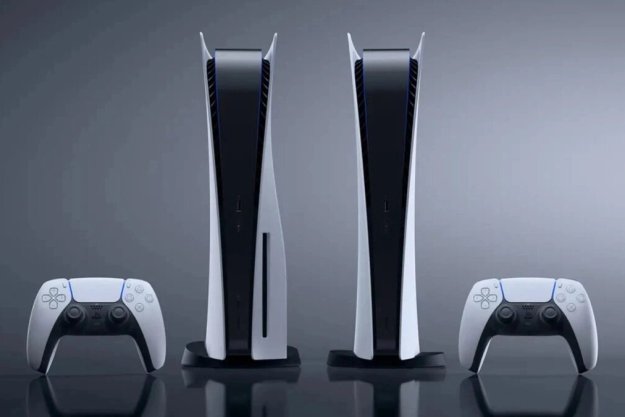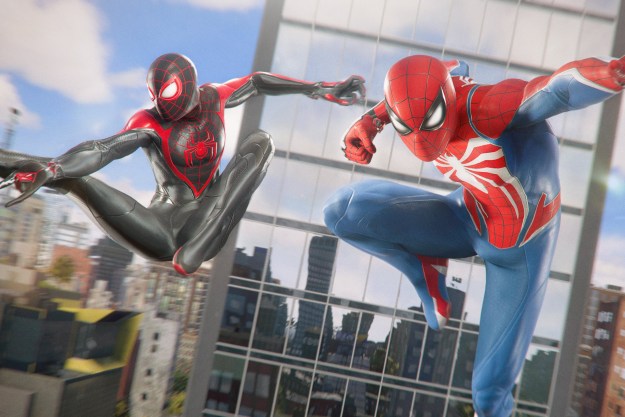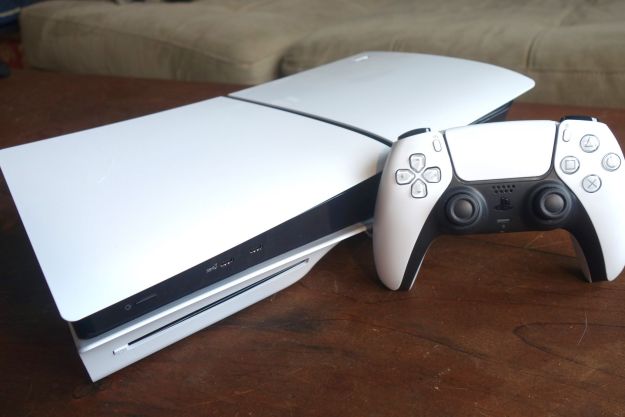
“Sony's PlayStation 5 is still the console to buy this generation, especially thanks to its improved redesign.”
- Speedy hardware
- Excellent game load times
- Solid storage
- Lots of must-own exclusives
- New controller with enhanced haptics
- Awkward design, even on new model
The expectations for Sony as it went into the current console cycle were preposterously high. The PlayStation 4 was a rousing success, and gamers were anticipating that the company would open new, previously unimagined possibilities with its next-generation system.
The PlayStation 5 not only met those expectations, it made them seem conservative. With lightning-fast load speeds and innovative (and captivating) changes to the DualShock controller, the PS5 sets the bar for the next generation of gaming.
While Digital Trends initially reviewed the PlayStation 5 over the course of just under two weeks, we’ve reevaluated the system a handful of times during its life due to its evolving nature. Our most recent refresh came when Sony released a slimmer new PS5 model in November 2023 that fully replaces the enormous 2020 model that we originally reviewed. That new version tackled some of our biggest problems with Sony’s system, addressing its poor storage and awkward size. Now, three years later, with a new machine in tow and a catalog of tons of high-profile exclusives, we’re still as high on the PS5 as we were at launch.
The hardware: It’s fast — really fast
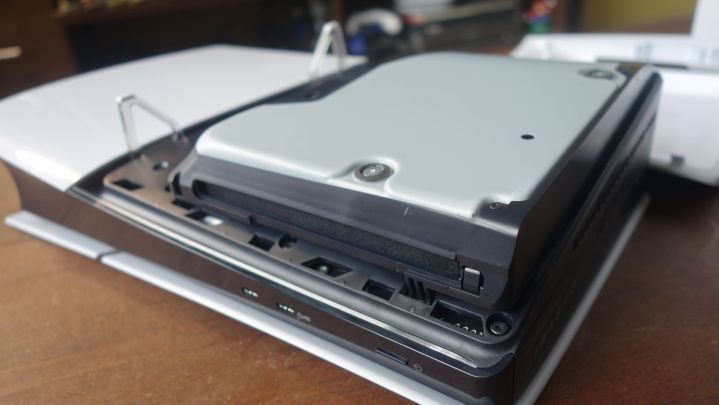
Sony, from the very beginning, has said the PS5 is about speed. But until you experience it, it’s hard to convey just how big a difference speed can make.
Marvel’s Spider-Man 2 features the greatest technical magic trick I’ve ever witnessed, as players can instantaneously fast travel around New York City in the blink of an eye. Other exclusives like Ratchet & Clank: Rift Apart take that to an even more impressive extreme, sending players in and out of different dimensions without a second of loading. Moments like that have delivered on Sony’s aspirational promises over the PS5’s life span, cementing it as the most impressive console on the market.
That optimization is also apparent in other Sony-published titles, like Horizon Forbidden West. It adds tremendously to the immersion factor of games, and it positively impacts the flow of the story in narrative titles. And the ability to jump into games quickly is just as satisfying.
It’s interesting to note this perceived difference in performance stems from software, rather than hardware. Technically, Microsoft’s Xbox Series X is the more powerful console, though the PlayStation 5 has an edge in storage performance. The Xbox lacks a strong exclusive library, however, and relatively few last-gen games take full advantage of the new console’s capabilities. This gives the PlayStation 5 a big advantage even two years on.
The design: still big, but better
That great power comes with a caveat. The original PS5 model was a honking big piece of hardware with some design flaws for those who wanted to lay it down horizontally. The 2023 model is something of a “slim” refresh that solves some of those problems. The new design is definitely smaller, though I wouldn’t call it compact. It still towers above just about any other console I put it next to. The Digital Edition is notably slimmer, though, which is an improvement.
The original system’s tricky stand issues have been resolved here too, but with a catch. The system comes with two simple plastic pins that stabilize the console in horizontal mode, but it no longer comes packaged with a vertical stand. Players now need to buy a $30 ring stand separately, which feels like a step backwards.
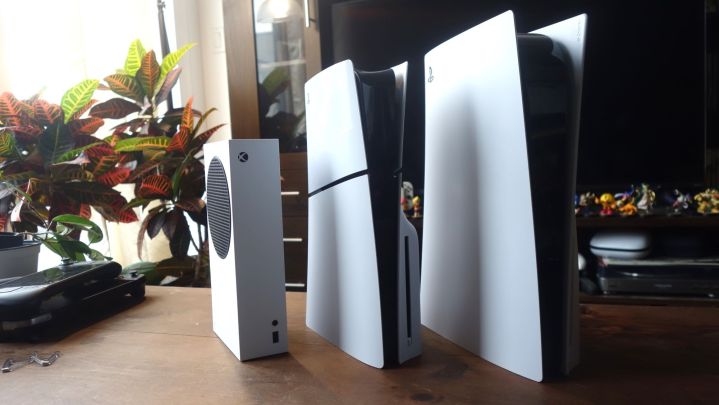
Microsoft’s Xbox Series X is a smaller, squatter console that isn’t quite as imposing, but its boxlike shape will still mean trouble for the average A/V cabinet. Gamers with limited space for a console may instead consider the Xbox Series S, which is much smaller than the PlayStation 5 or Series X and has a more traditional slate-like shape.
The new PS5 model does bring along a bit of tech innovation with its removable hard drive. Those who buy a Digital Edition won’t be stuck without disc drive access forever, as they can actually attach Sony’s specific Ultra HD Blu-ray drive for an additional $80. It’s a great idea that makes the PS5 more modular like a PC, but the math doesn’t exactly add up. The Digital Edition is $450, which is actually $50 more than the old version despite its smaller size. Considering that the disc drive version of the system still costs $500, you’d actually end up spending more money if you chose to add a drive on to the digital version later. That makes the Digital Edition feel superfluous, as it’ll hardly save you any money even if you don’t choose to upgrade it.
If you’re looking to grab one, your best option is to spring for the $500 model and place it horizontally. That won’t require any additional purchases.
Storage: There’s enough!
The PS5’s original Achilles’ heel was its poor storage space. Due to the proprietary solid-state drive and the size of the operating system, players only had 667GB of the 825GB hard drive available for games. It was a paltry amount, but you don’t have to worry about it anymore thanks to the new model. The machine now has 1TB of internal storage, matching the PS4 Pro. Around 842GB of that is usable, which is actually 40GB more than the Xbox Series X (though slightly less than the PS4 Pro). That gives the new PS5 models the most storage of any current-gen console.
Owners can expand that amount by buying and installing an NVMe PCIe 4.0 SSD. The console has an open SSD slot for just that purpose, and we’ve put together a list of some of the best SSD options you can find. These are the only hard drives that will let you take advantage of the PS5’s load speeds. A typical NVMe PCIe 4.0 SSD is about $200, which isn’t cheap. On the plus side, it’s a bit less than the $220 storage cards used by Microsoft’s Xbox Series X and S consoles.
You can also hook up an external HDD or SSD, but you won’t see the speed advantages of the system on any games stored there. And any PS5 games stored there won’t be playable until you transfer them to the internal drive, making external drives useful only for older games.
The controller: It’s a win
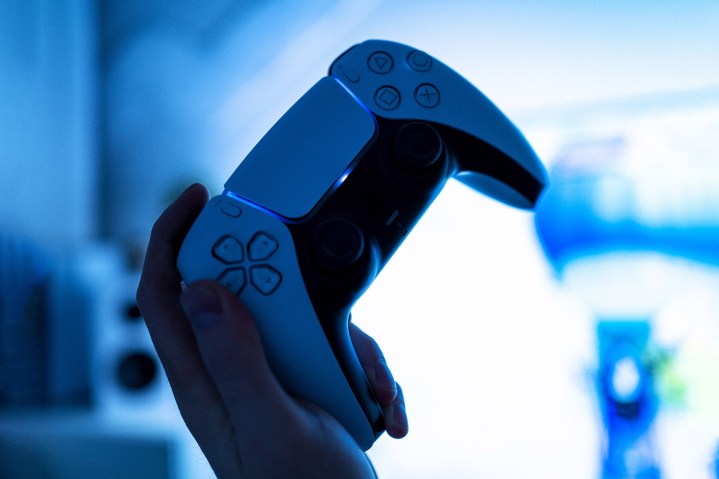
If load times are the primary weapon of the PS5, the new DualSense controller is the secondary one. And it’s impressive.
Slightly larger than the DualShock 4, it refines haptic feedback, incorporating a precise sense of touch into the video game experience that force feedback never did before. This could become hokey (and, in fairness, it might in years to come), but for now, it adds another layer to games, increasing player immersion.
Struggling to pull open a heavy door or draw a bow? The hand triggers can convey that tension. Had a rough landing as you drive over a hill or a slog through a muddy area? You’ll know it. This new haptic feedback is a subtle thing that, like the lack of load screens, you’ll soon take for granted. You won’t realize how quickly you’ve gotten used to it until it’s not there.
So far, the special features have been hit-and-miss. Some games are a little too overeager to play with the adaptive triggers, making them physically difficult to play. But the handful of games that really take advantage of the controller show just how special it is. Returnal, for instance, uses haptic feedback incredibly well, letting you feel every drop of rain or simulating a parasite squirming in your hands. Moments like that make the PS5’s experiences unlike anything on the market today.
A new built-in microphone is less useful in most games, but will allow you to briefly chat with friends without a headset.
The cost of this new functionality is battery life. The DualSense has a rechargeable battery (versus the Series X’s reliance on AA batteries), but we found that charge will drain quickly. Charging via the PS5’s USB rarely resulted in a full charge, whether in standby mode or if left on at full power. A separate charging stand, provided by Sony, did charge the controller fully.
PlayStation 4 controllers will work with the PlayStation 5, but only with PS4 games played through backward compatibility. Microsoft offers controller cross-compatibility that lets old Xbox One controllers work with the new Xbox.
Games and software: The star of the show
Microsoft found itself in the awkward spot of having to debut a new console without a first-party launch title, but Sony was in an enviable position initially. Spider-Man: Miles Morales gave it an edge out the gate, but a lot has changed since 2020.
Marvel’s Spider-Man 2 is terrific fun that showcases many, if not all, of the PS5’s features. God of War Ragnarok, Horizon Forbidden West, and Returnal are all must-own first-party titles. The bundled Astro’s Playground is a hidden gem of a platformer, loaded with Easter eggs that hark back to a stripped-down Super Mario Bros., while still acting as a walkthrough of the PS5 controller’s new features.
Third-party games have helped the PS5 build up a sizable library of hits too. Strong support from Square Enix has given the system console exclusives in Final Fantasy 16 and Final Fantasy VII Remake Intergrade. Baldur’s Gate 3 was available on PS5 before it hit Xbox, which was a big moment for the system too. Combine all those with great current-gen exclusive titles like Star Wars Jedi: Survivor, Dead Space, and Resident Evil 4, and you’ll have plenty of games to play if you pull the trigger.
On top of that, Sony recently relaunched its PS Plus service, giving subscribers access to over 700 games. That includes some retro titles dating back to the PS1 era. While it’s not as compelling as Game Pass, it’s a much-needed service that gives PlayStation fans something to do in-between all the big-ticket games. Sony has a better ecosystem built now than it did at launch, which has only made the PS5 a stronger value.
The long term
The PS5 is still the system to beat in this console generation, but while previous cycles had a clear path forward, this one is much cloudier. In its first few years, there was always a handful of big first-party games on the horizon. The PS5’s future became much harder to read after the release of Marvel’s Spider-Man 2, as Sony planned to break into live-service games. Those plans have reportedly been stalled, with Video Game Chronicle reporting that six of its 12 upcoming games are delayed past March 2026.
It’s unclear what’s exactly in the pipeline for PS5 long term, as games like Marathon or the planned Last of Us multiplayer spinoff seem to be in temporary limbo. There aren’t too many big, single-player releases currently in the works to make up for that — at least that we know about.
In terms of the broader ecosystem, we know even less about PlayStation VR2, the PS5 headset that Sony has struggled to support with first-party hardware since launch. Elsewhere, Sony is making a bigger push into cloud gaming with its PlayStation Portal handheld. Those who really want to buy into the PS5 ecosystem have a lot of ways to do so once they purchase the system. It’s just unclear where all of this is leading to long term as plans seem to be rapidly shifting around within Sony this generation.
That’s the future, though. For now, Sony has delivered a terrific next-generation console, complete with a slew of must-play, system-selling exclusives. It successfully built on the momentum of the PS4, innovated without reaching too far, and gave gamers a lot to occupy themselves with during some rough patches over the last few years. The new model only makes a better case for Sony’s system by providing the size reduction and storage increase it desperately needed.
Editors' Recommendations
- The best games on PlayStation Plus, Extra, and Premium
- Sony’s latest partnership is a big move for PlayStation’s mobile future
- Got a PS5? Here’s how to get 6 free months of Apple Music
- The best PS5 exclusives
- The PS5 games with the best graphics




